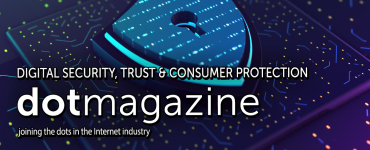There are any number of good reasons as to why the Internet industry needs female reinforcement. Numerous fields in the branch are up against a shortage of skilled workers. What’s more, homogeneous teams and uniform ways of thinking represent a clear obstacle to innovation. The digital industry is booming, new digital business models are being created each and every day, and lucrative jobs are being created – but all too often, women are still missing out. We want to change that. In our series “Women in the Tech Industry”, we invite inspiring female specialists and executives from the Internet industry to take the floor. Here we deal with the really important topics: from development perspectives, through career tips and hopes for the future, to the challenges in a male-dominated working environment – and ultimately, to highlighting why working in the Internet industry is fun. This time with: Tijen Onaran, CEO & Founder with GDW Global Digital Women GmbH.
What is stated on your business card?
Onaran: I actually did away with business cards because I was hardly using them anymore. At events, it’s now more along the lines of quickly pulling out your mobile phone and networking over digital platforms like XING, LinkedIn, Twitter, or Instagram. I also find that more sustainable. If I did have one, what you’d read there would be: Tijen Onaran, CEO & Founder with GDW Global Digital Women GmbH.
You are an entrepreneur, speaker at events and panel discussions, write for Handelsblatt, among others, have just published a book on networking, and advocate for the networking and visibility of women in the digital industry in the international initiative Global Digital Women. What would I need to do to achieve as much as you? What could I expect on a typical working day?
Onaran: So, in any case you would have to have a lot of stamina and a lot of patience. And the ability to start afresh every day, because there are no habits and routines. It is also important to derive pleasure from risk and uncertainties, which is simply part of entrepreneurship. It can all spin and turn so fast. It is possible that at the end of the week you are at a completely different point than at the week’s beginning. This requires above all resilience, strength, endurance, and energy.
You are without a doubt a role model for many women. If a woman of any age were to ask you for a career tip, what might it be?
Onaran: I think it’s important that you keep saying to yourself: There’s nothing that I cannot do – whether you’re starting a company or working for a company. It is essential not to be discouraged and to follow your own path and know where you want to go. That was also my basic approach. I worked very intensively on what I am really good at and what I want to achieve in life. The clearer you are yourself, the clearer you are for those around you. This is very important if you are looking for a mentor, for example. The best mentoring relationships are those based on such clarity. Therefore for me the credo is: Be aware of what you want to achieve, what you expect from yourself, what you want, and never let yourself be side-tracked from this path.
Do you yourself have any role models? If you had the chance to meet some female personality, either living or dead (ideally from the tech industry): Who would it be and why?
Onaran: In the first place, I have great parents who have always been my role models and who always will be. It is so important to have people around you at a very early age who inspire you – ideally your family. In my professional life today, it would be Melinda Gates, who I’ve never had the pleasure to meet in person. I think she’s great because she also uses her presence and strength to empower women in the tech industry. She is also very committed to the topic of diversity in the tech industry.
You are the founder of Global Digital Women, a network that campaigns for increased numbers of women in the Internet industry. In your opinion, what are the central topics that are mobilizing women?
Onaran: What drives many women is undoubtedly the question of digitalization with regard to careers – and whether it is actually true that digitalization is increasing women’s career opportunities. That’s one of my theses and one of which I am personally very convinced. There are also various studies that back this up. At the regular meetings of the Global Digital Women, however, we ask ourselves not only whether, but how exactly these new career opportunities emerge and how they can be taken up. We look at various professional fields and are guests at companies where the woman host talks about her job, 100 to 150 percent of which has to do with digitalization – for example, as a CDO or CIO. It’s very exciting to see the different life and career paths and to realize that you don’t have to know how to programme to end up in the digital industry – but that you have to understand the mechanism behind programming, and you have to understand its language. This is what we want to show with our work, that there are incredible opportunities offered by digitalization and that completely new job profiles are emerging. It is time for women to seize these opportunities, because their visibility will also rise thanks to digitalization.
What do the digitalization-based opportunities for women look like in practice?
Onaran: In the first place, there are new jobs and job descriptions that didn’t exist ten years ago, such as CDO or CIO. New posts often lead to the creation of a new department or the establishment of new staff units. This creates a great opportunity to bridge the types of hierarchical divide which you often find in companies. If women hold such positions, they can rise up the ranks relatively quickly. The second opportunity concerns the question of visibility. Without digitalization, there would be no Internet, and without the Internet, there would be no social media. I’m pushing the topic of visibility very hard: because women who show-case themselves digitally, engage in storytelling, and talk about their successes gain unbelievable visibility and are no longer dependent on their boss patting them on the shoulder and saying: “You’re doing a great job”. External visibility also increases internal visibility. This means that what these women do in companies suddenly becomes clear and tangible to all.
In an article published earlier this year in Handelsblatt 2019 you wrote “2019 is the year of women”. We’ll now make you editor-in-chief of a leading media publication – let’s say, the German BILD paper, or the German FAZ newspaper: Which headline would you like to see in a lead article concerning “Diversity/Women in the Tech Branch”? And what should the article say?
Onaran: I’d like to read: No digitalization without women. Because that’s the way I see it. One of our claims already is: Without diversity no digitalization. But to put it bluntly, I would focus on women and gender issues. There is simply so much catching up to do. This is just as true for large corporations as it is for medium-sized companies or startups. There are still fewer women in these jobs. So that’s the headline I’d like. The article itself would show-case role models who already hold digital roles in companies. In addition, it would also address what it means in concrete terms to integrate more women or more diversity, more gender diversity, into companies. In concrete terms: what this means for the ability to innovate, why it is important to be competitive. Why young talents are so set on diversity. There are studies out there, and that’s what I’d be aiming for in the article.
On your Twitter account you once posted: “Quite a lot of guys in the founder scene are the ‘bad pitch’ personified. Swagger above personality, ego above team-work, and performance above competence. It’s time there were more women investors!” Are there stereotypical male behaviors that bother you? And do you have any advice as to how, as a woman, I should effectively counter these?
Onaran: I’m not a fan of stereotypes. When I tweeted that, it was after a telephone conversation with a founder who viewed himself as amazing and as very important. I was very perturbed by this, because I felt that I was constantly coming back to this point – be it in the startup scene or in other sectors and areas – where there was a certain type of man who took certain roles completely for granted. The type who says: “In management positions you need a ‘bang on the table’ mentality and an ‘elbow culture’.” I think they’re just people who have been socialized differently. However, there is now simply a new era and a new corporate culture where, for example, you should no longer opt for classical hierarchies, but rather promote collaboration. Companies simply realize that the new generation demands it. This requires a new mentality and a new understanding of leadership. And that’s why these kinds of guys are going to disappear over time. Because they are up against it with the way they see themselves as bosses. And there are many young people, young men in particular, who totally reject this behavior. They don’t want to sit at a table with just one type of person, and they don’t just want to work with men.
If I nevertheless were to come across this type of guy in my professional everyday life, would you have a tip for how to deal with him? How do I display confidence in nipping that type of behavior in the bud?
Onaran: Responding with sharp-witted retorts really helps. Really work on that skill. When you feel that you’ve got into a strange discussion, ask yourself how you can respond in a quick-witted manner. The other thing is, if you really don’t feel comfortable, then you have to confide in someone. If you realize that it’s about power games or demonstrating who’s now totally important in the company, then it helps to build alliances. Who can I forge alliances with? What kind of network do I need within a company? Then you should count on these advocates. That’s why the networking topic is so important to me. The moment you have people who have your back, it doesn’t matter that there’s a guy rearing his head from the dark ages. Because you will always have people who support you in what you do and who will have your back. Which is why you should work on your network yourself, find advocates, and develop a healthy dose of repartee. If you realize that all this does not help, then you really have to go the official path and make sure that you point out boundaries and actively communicate about overstepping the mark.
What is or has been your trickiest professional challenge so far? And did it have anything to do with your being a woman?
Onaran: So the trickiest professional challenge for me was and still remains positioning my company to respond to the growth we are currently encountering. To keep on top of all the things we’re involved in. For example, processes that we need to optimize and all those challenges that startups – as we are at moment – face as they grow. I think my advantage is that I founded and run my company together with my husband. It is simply really, really clear to me that our different points of view help us enormously in our professional everyday life. I’m very happy that he’s there because his perspective is completely different from mine. This is a great addition to our work. I am someone who works very quickly and wants to have projects implemented fast, preferably by the next day. Often, however, I didn’t think about what it would take to put ideas into practice. My husband thinks through everything from A to Z. What are the risks? What can happen if things aren’t going well, but even if they are? This holistic perspective naturally helps a lot with my situational perspective, meaning that when we approach projects, we have the drive on the one hand, and on the other hand a thoughtfulness and a longer-term view, which then helps to set the project up in such a way that it works.
What does the ideal team look like? In your opinion, is there a formula for success for the composition of teams?
Onaran: So from my experience: the more diverse the better. I see that with us – our team currently comprises of ten people, which is already a size where you can recognize and evaluate team dynamics. Diversity isn’t only about different genders, it’s also to do with different types of experiences. If, for example, the team consists of people who have founded their own company, then of course they bring this topic of entrepreneurship strongly to the table. They also think entrepreneurially within the company. Or there are people who have been working for an administrative office or an authority for quite some time, who of course also introduce certain sustainability and processes. But diversity also means effort. It’s not like we always sit there and reach a consensus really quickly. Diverse teams also mean that it takes time until you have agreed on a goal or the route to the goal. That is something that large companies sometimes shy away from, because diversity also means discussion and debate, and that can sometimes delay things, but at the end of the day it also leads to a greater level of innovation.
Networking is the topic closest to your heart. You just published your book “The Network Bible” (“Die Netzwerkbibel”). Supposing I want to expand my network: What quick tips could you give me?
Onaran: First of all, what’s very important is to answer the question concerning where you currently are in your career, and what your expectations are from your network. So, for example, is it about taking the next career step or changing branch? That helps answer the question: What do I expect from my network, but also the other way around: What can I bring into my network? Networking consists of taking and giving. The second tip concerns social media. Social media democratizes networking. Because I can suddenly make contact with a lot of people, which was not possible in the past if they were based somewhere else, or were internationally active, or were above me in a hierarchy in a “traditional” company. The digital channels allow me to initiate the contact. Digital is something of a door-opener. Hence my call for action: Look at which of the channels is important for you and where you can and would like to invest time. And my last quick tip is to keep an eye on who the contacts are who are not just there when you’re successful, but also when you fail or lose a job. Who are the contacts you can fall back on during a crisis? My recommendation is to accord great value to sustainable contacts. My credo is: A really good network reveals itself in times of crisis. It is therefore not a question of focusing on quantity when networking, but rather on quality.
Thank you very much for the interview, Ms. Onaran.
Further information on women in the tech industry can be found on our New Work Competence Group site.




